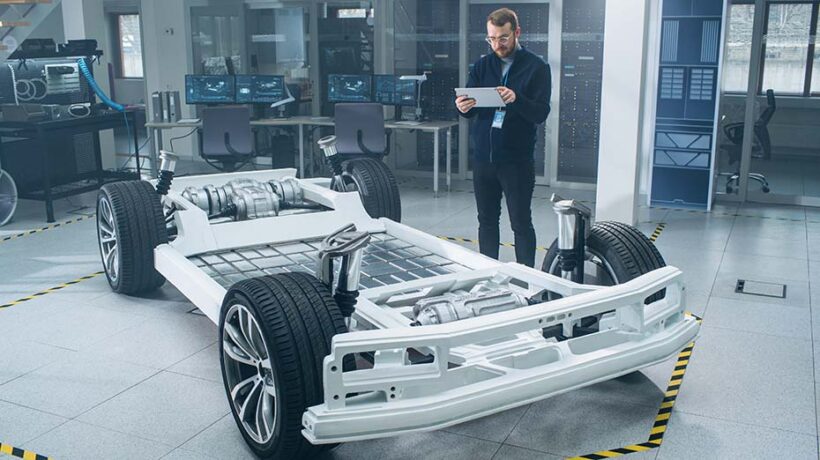Technology is developing at a rapid pace. However, this development is boosting the evolution of the world, societies, and all domains that rely heavily on technology. Education, traveling, art, counseling and therapy, construction, and many others. Among the domains that are highly impacted by the technological advancements we see today is car manufacturing. As cars support traveling as one of the main ways of going from one place to another, they need to be safe and secure.
So, automotive engineering is and will be one of the most essential domains that need well-prepared engineers. So, what is the future of automotive education? Many students decide to study it and learn about its secrets in college. How are universities preparing the next generation of car engineers?
The New Automotive Engineering

As technology advances rapidly, it creates new solutions for every domain. We can easily notice the rise of cars which have many features that add more to the safety of passengers. For example, the feature that automatically calls 911 when you have a crash. This is part of the new auto engineering. But the future of automotive engineering relies on self-driving cars. There are not so many models operating in the US or the rest of the world, but they are proof that the future of automotive will look different.
This is why this domain needs students who are passionate about these technologies but also know how to use and apply them. Getting an automotive education is challenging, but you learn so many new things about this fascinating domain. Usually, some of the tasks you have to complete are written. They ask you to explore the future of automotive or just analyze its benefits.
Learning about self-driving cars is one of the technologies that will govern the future of automobiles. Of course, there is still room for improvement and development. However, you do not only learn about the engineering car behind it but also about the software and sensors it uses to be efficient. Many vehicles already have self-automation functions. And even though there is no fully autonomous vehicle operating on the streets, we are getting closer to it.
Legal and Ethical Implications
The fact that technology is more and more intertwined with our lives is something we are already aware of. However, many scholars think about the legal and ethical implications that come with it. And this is a topic students learn more about in college too. Can vehicles that are driverless replace the workers in this domain?
We currently have people who are transporting food, clothes, electronics, and many more from one place to another. What is the future of the driver’s job if cars do not need someone to drive them anymore? Technological advancements come with legal and ethical implications that will change society as we know it. And this needs to be approached in college, as it is part of the future of the automotive industry.
STEM Education

The fascination for cars and the automotive industry comes naturally from kids. Some already know they want to work in this industry, so they could represent the next generation of car engineers. Even though their interests might change as they grow up, having classes that introduce them to this domain would be really helpful. Students are both fascinated and intrigued by these new technologies that make automobiles driverless.
Having the opportunity to get hands-on experience and talk with domain experts would help them understand more about it. Also, having tasks like building automobiles on a small scale can help them understand the engineering behind them. Educators have a powerful role and they can help students learn more about this domain.
Exploring the Benefits of a New Technology
Technology has always been a driving force behind economic, social, and cultural progress. This can especially be seen in the adoption of new technologies such as artificial intelligence (AI). AI has quickly become an integral part of our lives, enabling us to do more with less effort and cost. The applications of AI are vast and ever-expanding as organizations discover new ways to leverage its power. In this article, we will explore the benefits that come with adopting a new technology like AI.
One of the primary advantages of introducing a new technology is increased efficiency. By utilizing AI, companies can reduce their labor costs while improving their output. This is particularly beneficial for businesses that rely on manual processes or those that must manage large amounts of data. By automating tasks formerly done by humans, companies can reduce overhead costs and improve their bottom line. Additionally, it allows them to free up resources for other pursuits, such as developing innovative products or improving customer service.
Another advantage of embracing a new technology like AI is improved accuracy. AI machines are able to analyze massive amounts of data much faster than humans could ever hope to do manually and they can identify patterns that were previously undetectable by humans. This level of accuracy can save businesses money by reducing errors made during production or delivery and it increases the security of important information by detecting potential threats before they become major problems.
Finally, one cannot ignore the potential positive impact that technological advancements have on society at large. As more industries adopt innovative solutions like AI, more people will benefit from better access to medical care, education resources, employment opportunities and other services that improve quality of life. Such advances also lay the groundwork for future generations who will no doubt continue finding ways to use technology for benefiting mankind as a whole even further.
Final Thoughts

Technology is changing the world and is helping it advance rapidly. It has a powerful role in the automotive industry, which is advancing more and more day by day. The future of driverless vehicles is close. And it comes with legal and ethical implications. However, it is fascinating and intriguing for many students. So, giving them the opportunity to learn more about it actually helps prepare the next generation of car engineers.

